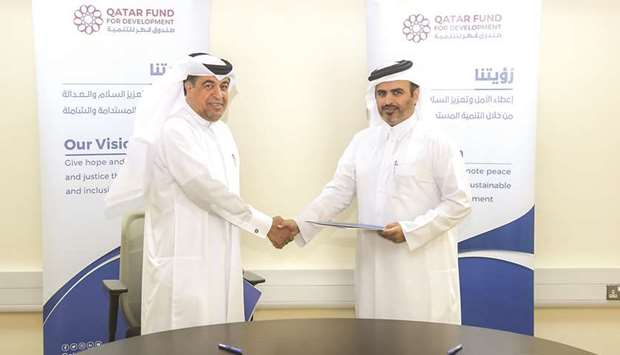Qatar Fund for Development (QFFD) and Qatar Red Crescent Society (QRCS) have signed a $8mn funding agreement to address the humanitarian and medical needs of more than 623,000 beneficiaries in Libya.
The agreement was signed by Director of Development Projects at QFFD Misfer Hamad al-Shahwani and Director of Relief and International Development at QRCS Rashid Saad al-Mohannadi.
Commenting on the occasion, Ambassador of Qatar to Libya Sheikh Mohamed bin Nasser bin Jassim al-Thani said that the donation builds upon the continuous Qatari humanitarian endeavours in Libya since 2016.
He added that it is part of a larger $10mn initiative announced by Qatar to help improve the conditions in the war-torn country, through diverse humanitarian operations in co-operation with the Libyan Red Crescent.
Following the signing ceremony, al-Shahwani said: “This joint work is aimed at meeting the humanitarian needs of the affected communities, in the fields of food security, water and sanitation, and nonfood aid. Also, it is planned to throw out a lifeline to hospitals and health centres, operate mobile clinics, and launch capacity-building programmes for medical professionals”.
Al-Mohannadi thanked QFFD “for this generous support to QRCS’s ongoing relief work in Libya. With these funds, we will be able to expand our intervention to take in more and more beneficiaries. Our ultimate goal is to alleviate their suffering in such a protracted ordeal, while respecting their dignity”.
Al-Mohannadi said the partnership was a reflection of Qatar’s unwavering support for the vulnerable, particularly in regional war zones like Syria, Iraq, Yemen, and Libya.
Under the agreement, a relief action plan will be implemented in southern cities of Libya, covering many aspects. Some of them include training 180 physicians, nurses, and midwives, providing three major hospitals and three health centres with medicines, equipment, and medical consumables, as well as deploying mobile medical convoys to three underserved districts.
The partnership will also work on distributing food packages to 4,000 households, containing rice, pasta, canned tuna, sugar, and other food staples. They will also dig water wells and install pumps and power generators for three cities, with an overall population of 100,000 people. There will also be nonfood items will be distributed to 4,000 households. These include mattresses, adults’ and kids’ blankets, and rugs.
Another two supplementary schemes will be pursued, one to procure medical supplies for Misurata Central Hospital, and the other to support the Azzaytuna University in Tarhuna with academic equipment, educational materials for labs, an e-library, lab renovation, and voltage regulators.

Director of Development Projects at QFFD Misfer Hamad al-Shahwani and Director of Relief and International Development at QRCS Rashid Saad al-Mohannadi exchange documents after signing the agreement.
